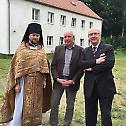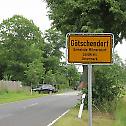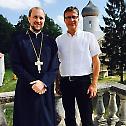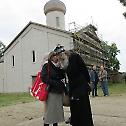27. November 2017 - 10:05
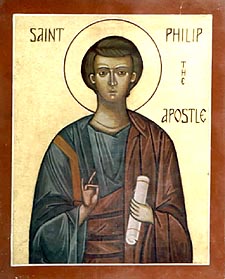 The Holy and All-praised Apostle Philip was a native of the city of Bethsaida in Galilee. He had a profound depth of knowledge of the Holy Scripture, and rightly discerning the meaning of the Old Testament prophecies, he awaited the coming of the Messiah. Through the call of the Savior (John 1:43), Philip followed Him. The Apostle Philip is spoken about several times in the Holy Gospel: he brought to Christ the Apostle Nathaniel (i.e. Bartholomew, April 22, June 30, and August 25. See John. 1:46). The Lord asks him where to buy bread for five thousand men (John. 6: 5-7). He brought certain of the Hellenized Jews wanting to see Jesus (John. 12:21-22); and finally, at the Last Supper he asked Christ to show them the Father (John. 14:8).
The Holy and All-praised Apostle Philip was a native of the city of Bethsaida in Galilee. He had a profound depth of knowledge of the Holy Scripture, and rightly discerning the meaning of the Old Testament prophecies, he awaited the coming of the Messiah. Through the call of the Savior (John 1:43), Philip followed Him. The Apostle Philip is spoken about several times in the Holy Gospel: he brought to Christ the Apostle Nathaniel (i.e. Bartholomew, April 22, June 30, and August 25. See John. 1:46). The Lord asks him where to buy bread for five thousand men (John. 6: 5-7). He brought certain of the Hellenized Jews wanting to see Jesus (John. 12:21-22); and finally, at the Last Supper he asked Christ to show them the Father (John. 14:8).
25. November 2017 - 22:53
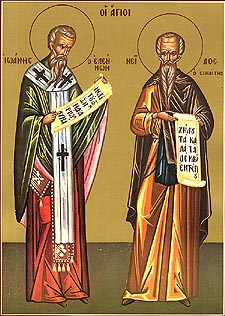 Saint Nilus the Faster of Sinai, a native of Constantinople. He lived during the fifth century and was a disciple of Saint John Chrysostom. Having received a fine education, the saint was appointed to the important post of prefect of the capital while still a young man. During this period, Nilus was married and had children, but the pomp of courtly life bothered the couple. Saint John Chrysostom exerted a tremendous influence upon their lives and their strivings. The spouses decided to separate and devote themselves to the monastic life.
Saint Nilus the Faster of Sinai, a native of Constantinople. He lived during the fifth century and was a disciple of Saint John Chrysostom. Having received a fine education, the saint was appointed to the important post of prefect of the capital while still a young man. During this period, Nilus was married and had children, but the pomp of courtly life bothered the couple. Saint John Chrysostom exerted a tremendous influence upon their lives and their strivings. The spouses decided to separate and devote themselves to the monastic life.
The wife and daughter of Nilus went to one of the women’s monasteries in Egypt, and Saint Nilus and his son Theodulus went to Sinai, where they settled in a cave dug out by their own hands. For forty years this cave served as the dwelling of Saint Nilus. By fasting, prayer and works, the monk attained a high degree of spiritual perfection. People began to come to him from every occupation and social rank from the emperor down to the farmer, and each found counsel and comfort from the saint.
24. November 2017 - 10:32
 TWENTY-FIFTH SUNDAY AFTER PENTECOST: SAINT JOHN CHRYSOSTOM, ARCHBISHOP OF CONSTANTINOPLE
TWENTY-FIFTH SUNDAY AFTER PENTECOST: SAINT JOHN CHRYSOSTOM, ARCHBISHOP OF CONSTANTINOPLE
RESURRECTIONAL TROPARION - TONE EIGHT: Thou didst descend from on high, O Merciful One! Thou didst accept the three day burial to free us from our sufferings! O Lord, our Life and Resurrection: Glory to Thee!
20. November 2017 - 9:45
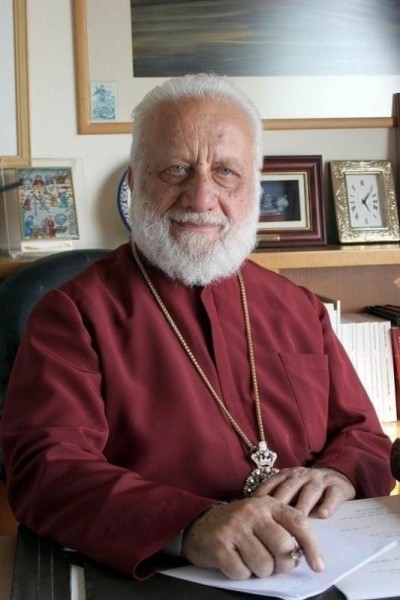 This is the question of life: who is my neighbor? People think that the neighbor is a spouse, a child or an uncle, all those we call “relatives,” and people distinguish between neighbors and strangers. A neighbor is someone with whom we share our tastes, our religion, or kinship and a stranger is someone with whom we differ and whom we find foreign.
This is the question of life: who is my neighbor? People think that the neighbor is a spouse, a child or an uncle, all those we call “relatives,” and people distinguish between neighbors and strangers. A neighbor is someone with whom we share our tastes, our religion, or kinship and a stranger is someone with whom we differ and whom we find foreign.
Here the teacher of the law comes to Jesus, a theologian in Israel who had to have known the answer to the question before asking, and so the Bible says that he came to test Jesus and asked him, “How may I be saved?” Jesus replies, “Love the Lord your God with all your heart, with all your soul, with all your strength and love your neighbor as yourself.” The man knew that the Law of Moses commands love, but it distinguishes neighbor from foreigner. The Law says, “Only love the Jew.” Non-Jews are called “gentiles” and Jews had nothing to do with them.
19. November 2017 - 16:21
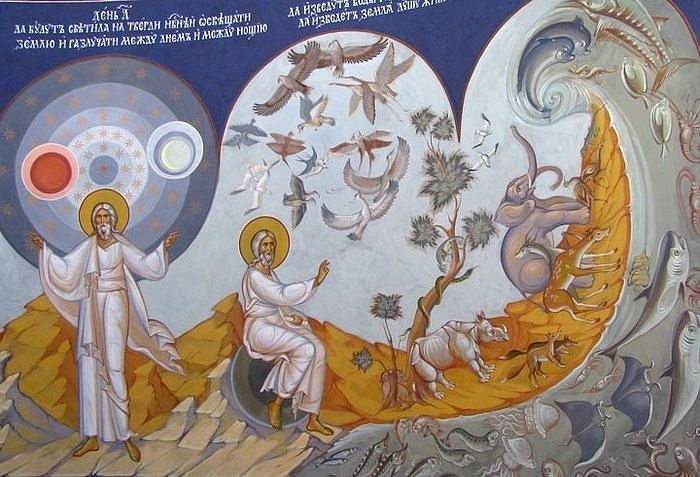 The worship of the Orthodox Church is closely connected with the sacred history of the Old and New Testaments. It as if illustrates this history from the very beginning, symbolically and spiritually, deeply connected with it.
The worship of the Orthodox Church is closely connected with the sacred history of the Old and New Testaments. It as if illustrates this history from the very beginning, symbolically and spiritually, deeply connected with it.
That is why the rite of the All-Night Vigil begins with the doxology to the Holy Trinity: “Glory to the Holy, Consubstantial, Life-Creating, and Undivided Trinity, always, now and ever and unto ages of ages!” That is, God has always been: before time, before the creation of the world, and we must glorify Him. The choir answers on behalf of the people, “Amen,” which translated from Hebrew means “Truly,” or “Let it be.” Then is read the prayer of worship of the Holy Trinity, “O come let us worship…” and the 103rd psalm is sung, during which the priest and deacon perform the censing of the entire church and the congregation.
2. November 2017 - 16:22
Igumen Daniel (Irbits), Abbot of the Monastery of St. George in Götschendorf (Germany), analyzes the characteristics of Christian pilgrimage, and when it has a good effect and when a harmful effect on the human soul.
 The worship of the Orthodox Church is closely connected with the sacred history of the Old and New Testaments. It as if illustrates this history from the very beginning, symbolically and spiritually, deeply connected with it.
The worship of the Orthodox Church is closely connected with the sacred history of the Old and New Testaments. It as if illustrates this history from the very beginning, symbolically and spiritually, deeply connected with it. 
 The Holy and All-praised Apostle Philip was a native of the city of Bethsaida in Galilee. He had a profound depth of knowledge of the Holy Scripture, and rightly discerning the meaning of the Old Testament prophecies, he awaited the coming of the Messiah. Through the call of the Savior (John 1:43), Philip followed Him. The Apostle Philip is spoken about several times in the Holy Gospel: he brought to Christ the Apostle Nathaniel (i.e. Bartholomew, April 22, June 30, and August 25. See John. 1:46). The Lord asks him where to buy bread for five thousand men (John. 6: 5-7). He brought certain of the Hellenized Jews wanting to see Jesus (John. 12:21-22); and finally, at the Last Supper he asked Christ to show them the Father (John. 14:8).
The Holy and All-praised Apostle Philip was a native of the city of Bethsaida in Galilee. He had a profound depth of knowledge of the Holy Scripture, and rightly discerning the meaning of the Old Testament prophecies, he awaited the coming of the Messiah. Through the call of the Savior (John 1:43), Philip followed Him. The Apostle Philip is spoken about several times in the Holy Gospel: he brought to Christ the Apostle Nathaniel (i.e. Bartholomew, April 22, June 30, and August 25. See John. 1:46). The Lord asks him where to buy bread for five thousand men (John. 6: 5-7). He brought certain of the Hellenized Jews wanting to see Jesus (John. 12:21-22); and finally, at the Last Supper he asked Christ to show them the Father (John. 14:8).
 Saint Nilus the Faster of Sinai, a native of Constantinople. He lived during the fifth century and was a disciple of Saint John Chrysostom. Having received a fine education, the saint was appointed to the important post of prefect of the capital while still a young man. During this period, Nilus was married and had children, but the pomp of courtly life bothered the couple. Saint John Chrysostom exerted a tremendous influence upon their lives and their strivings. The spouses decided to separate and devote themselves to the monastic life.
Saint Nilus the Faster of Sinai, a native of Constantinople. He lived during the fifth century and was a disciple of Saint John Chrysostom. Having received a fine education, the saint was appointed to the important post of prefect of the capital while still a young man. During this period, Nilus was married and had children, but the pomp of courtly life bothered the couple. Saint John Chrysostom exerted a tremendous influence upon their lives and their strivings. The spouses decided to separate and devote themselves to the monastic life.
 This is the question of life: who is my neighbor? People think that the neighbor is a spouse, a child or an uncle, all those we call “relatives,” and people distinguish between neighbors and strangers. A neighbor is someone with whom we share our tastes, our religion, or kinship and a stranger is someone with whom we differ and whom we find foreign.
This is the question of life: who is my neighbor? People think that the neighbor is a spouse, a child or an uncle, all those we call “relatives,” and people distinguish between neighbors and strangers. A neighbor is someone with whom we share our tastes, our religion, or kinship and a stranger is someone with whom we differ and whom we find foreign.